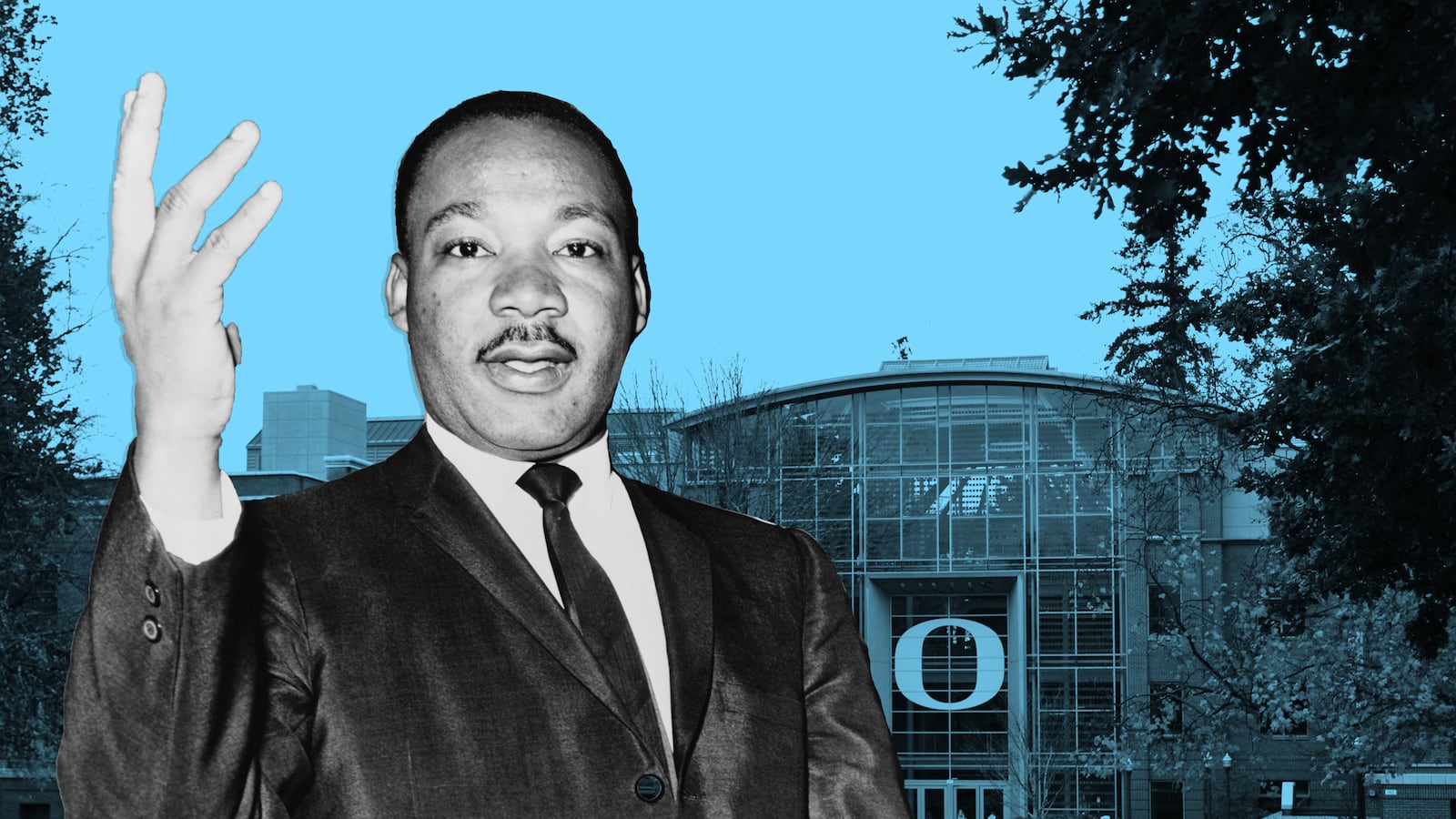For many of today’s college students, it is not enough to agree with them on some things—one must accept their entire agenda, all at once, or be branded an enemy of progress.
For a galling example of this, look no further than the University of Oregon’s student union, which recently considered removing Martin Luther King Jr.’s “I have a dream” quote from the wall of a campus building. Why? Because the famous statement only references one kind of diversity—skin color—and is therefore not inclusive.
That was the opinion of at least one student, according to The Daily Emerald, the campus newspaper:
Laurie Woodward, the director of the Student Union, said that when she approached the union with the question of if they wanted to keep the current MLK quote or supplement a new one, one of the students asked, “Does the MLK quote represent us today?”
“Diversity is so much more than race. Obviously race still plays a big role. But there are people who identify differently in gender and all sorts of things like that,” sophomore architecture major Mia Ashley said.
Let’s review King’s quote, while we’re at it: “I have a dream that my four little children will one day live in a nation where they will not be judged by the color of their skin, but by the content of their character.”
It’s true, the quote makes no reference to other kinds of diversity, like gender or sexual orientation or disability status. But then again, King wasn’t so much celebrating diversity as he was championing tolerance and equal treatment for all people, regardless of categorization. King’s point was that everyone deserves the same rights as everyone else—implicitly, that includes people of varying genders, orientations, etc.
No wonder college students are uncomfortable with the quote: They worship categorization.
After all, the MLK quote, which adorns the campus’s Erb Memorial student union building, is not even the first innocuous statement of principle to run afoul of students’ all-or-nothing censorship. During the 1970s, the building featured a quote from an Oregon administrator that referenced “the quest for the good life for all men.”
This offended some students, who considered “all men” a non-inclusive descriptor. The dean himself refused to defend the line—he would not “give hostage to ignorance,” according to The Emerald—and the decision was eventually made to switch it out for the King quote.
This time, political correctness lost out—the student union doesn’t have any plans to scrub the King quote, for now. Still, the sentiment that imperfect aspects of American history should be whitewashed in order to make students more comfortable is a troublesome trend on college campuses. At universities all over the country, students are engaged in efforts to rename buildings and tear down statues that remind them of something or someone they would rather forget.
This movement reached peak insanity at Lebanon Valley College in Pennsylvania, where students petitioned administrators to rename the Lynch Memorial Hall, a building dedicated to former college president Clyde Lynch, because, well, “lynching” is bad.
It’s perfectly all right for students to organize protests against campus buildings that were named after, say, slaveholders—though they should be reminded that such efforts are purely symbolic and do not actually advance human rights in any measurable way. But the Lynch building kerfuffle, like the MLK quote, is a great example of an increasingly common kind of activism: Students trying to censor something that isn’t objectively offensive by any stretch of the imagination.
What’s driving this kind of activism? The left’s love of intersectionality, the theory that different kinds of “isms”—i.e. racism, sexism, ableism, homophobia, transphobia, etc.—are inextricably linked, may have something do with it. A King quote that condemns racism isn’t enough, this thinking goes, if it has nothing to say about sexism.
As Daily Beast correspondent James Kirchik recently noted in Tablet, intersectionality was the driving philosophical force behind the successful shutdown of a pro-LGBT+ reception sponsored by a Jewish group. This year’s pro-gay Creating Change conference in San Francisco was supposed to feature a presentation by an Israeli-friendly gay organization, but anti-Israel activists succeeded in pressuring organizers to cancel it. According to Slate’s Mark Joseph Stern, “The mere existence of a connection to Israel… was apparently too much for the 200 protesters at Creating Change.”
Kirchik observed: “Intersectionality compels one to adopt agendas that have nothing to do with his or her own.” Indeed, in the eyes of many pro-LGBT+ students, it is not enough to be in favor of gay rights—one must also side with Palestinians on issues relating to Israel.
I’m old enough to remember (and I’m only 27) when supporters of gay rights were eager and excited to accept support from people who had a wide range of views on other issues—recall that the successful lawsuit against California’s gay marriage ban was organized by Ted Olson, a conservative Republican and former U.S. Solicitor General under George W. Bush. That’s how coalitions organized around a single issue succeed: by uniting people who otherwise disagree.
But the modern campus left is an intersectionality ouroboros: the snake from Greek mythology that devours its own tail. It does not tolerate dissent, and it considers differences of opinion to be unbridgeable. Agreeing with Dr. King that racism is bad is insufficient. Standing with a pro-LGBT+ group that includes Jews is unacceptable. And even adopting all the correct liberal views is no guarantee of avoiding the angry mob, because these views must always be expressed in hypersensitive, politically correct language. A student could support equal rights for illegal immigrants, for example, but still be accused of committing a microaggression for neglecting to use the proper PC terminology: undocumented person.
Inclusivity doesn’t leave room for sanity on college campuses. And that’s a trend we should all find dispiriting.






